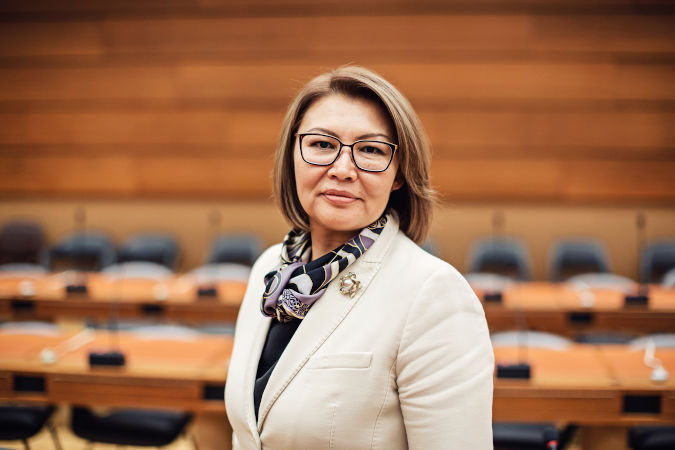Altynai Omurbekova: “We must offer our unconditional support to the youth so that they can further advance gender equality”
Date:

Altynai Omurbekova, Deputy Prime Minister of Kyrgyzstan, attended and co-chaired the 25th year Regional Review Meeting of the Beijing Platform for Action for the UN Economic Commission for Europe (UNECE) Region. She highlighted the meeting’s importance for advancing gender equality and promoting women’s rights.
What are the key priorities at this regional review meeting for you and the government of Kyrgyzstan? What key issues would you like to see solutions for?
Since the Beijing+25 Regional Review Meeting is taking place ahead of such significant milestone, now is the moment to take stock of where we are and how we can accelerate our efforts towards gender equality. This is a unique opportunity to notice the positive experience of other countries; to identify the problems that prevent us from implementing certain legislation; to share good practices. And, of course, to incorporate all these as the basis of the national documents that will be developed in the next five to ten years.
Today, the most relevant issues for our region and for us are women’s employment; women’s full access to healthcare services; violence against women and girls, and girls’ access to education.
What do you think are the key priorities in the Central Asia Region in accelerating gender equality and the empowerment of women?
Among the priority issues that I would like to mention are the importance of extending economic rights and opportunities for women and girls; also the pay gap between women and men, as well as pensions. In response to these challenges, we, the governments of all countries, must create special programmes to support women’s entrepreneurship, to train women for a very changing labor market. Nowadays, girls and women must adapt to changes in the labor market, learn new professions and acquire new professional skills.
During the past five years, what have been the main drivers for success in the area of gender equality in your country?
First of all, the main driver was the political will. Kyrgyzstan has a very strong civil society and strong experts in this area [gender equality]. I believe that the coordinated work of the government, civil society organizations, the expert community, and international organizations contributed to this success. All this together has led to the successful implementation and promotion of gender equality.
What have been the major obstacles to achieving gender equality and the empowerment of women during the past five years?
Unfortunately, these obstacles didn’t appear five years ago, but much earlier. I would attribute, first of all, the patriarchy, and certain social norms as well as stereotypes that exist in society and are probably inherent across the Central Asian Region. Further to that, gender equality is hindered by insufficient funds allocated to address issues such as violence against women, or promoting equal rights and opportunities for women and men, and increasing women’s political participation in decision-making processes.
What is your message to the youth about promoting the women’s rights agenda for future generations?
Firstly, youth should actively participate in events at the national, regional and international levels. They need to be sensitive to gender equality issues and be informed. They have to solve issues from a human rights perspective. Today, young people have more access to receive and exchange information, they are active in social networks. We, on the other side, must pass on our experience to them, and our unconditional support, so that they can further advance women’s rights and gender equality.